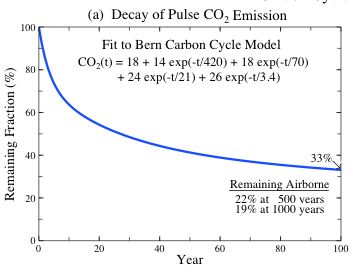But I still am not convinced we are not into something we have never, ever, ever seen before.
You are entitled to an opinion, however when assessing risks we need to look at facts.
We have nearly the lowest levels of CO2 in the planets history.
CO2s impact is logarithmic, that is it takes double to have the same impact each time.
We are starting from an actual ice age.
We are starting much deeper in the well than other climate changes. And as I said we have an enormous buffer in the Himalayas that other climate regimes may not have had.
Whats more, while it has a long tale, CO2 also does quickly drop. In about 40 years it drops in half.

This brings us to another two points. There are limits to how much fossil fuel we have and the oceans are huge.
It takes a very long time to warm them up.
Many past climate changes were from vulcanisity. These were events that lasted thousands and tens of thousands of years.
This was a long long time to warm up the oceans.
Even in a burn it all scenario our emissions will start coming down in a couple of decades from just not having anything left to burn.
It is possible you can devise a scenario where we burn so much so fast that it does release all the carbon sequestered in the oceans methane, and perhaps we do get the oceans hot enough to release the calcium carbonate etc and it does over come the rock weather etc etc etc. But you will need to show real studies, showing how this can happen.
But simply worrying about it is not really going to cut the mustard in convincing many who understand just how much energy it takes to heat an ocean.
Some thresholds that all would consider dangerous have no support in the literature
as having a non-negligible chance of occurring. For instance, a “runaway greenhouse effect”—analogous to Venus--
appears to have virtually no chance of being induced by anthropogenic activities. So our focus will be on those events
that the literature suggests have a non-negligible chance of being induced by anthropogenic activities.
IPCCI reserve my bets because of methane release.....Timescale is key.
Most of the methane is sequestered deep in the oceans. It has been released before when the earth was much hotter to start with. It took a long time for past CO2 levels to set it off.
By the time our heat pulse is getting into the deep ocean our carbon stores will have long been burned and the CO2 dropping. Also methane is released and quickly breaks down.
World expert on carbon cycles,
David Archer calculated the worst case scenario for Arctic methane.
Let’s err on the side of flamboyance (great word in this context) and say the concentration of methane in the air goes up by a factor of 10 for the duration of the extra methane emission (meaning that the lifetime doubles).
This is about twice the radiative forcing today from all anthropogenic greenhouse gases today, or (again according to Modtran) it would translate to an equivalent CO2 at today’s methane concentration of about 750 ppm. That seems significant, for sure.
http://www.realclimate.org/index.php/archives/2012/01/an-arctic-methane-worst-case-scenario/#more-10411It takes a lot of ifs, but, ands and hand waving to get that methane to the atmosphere quickly. Then when its there it would be disastrous... but nowhere near Venus Syndrome.
P.S. Don't disregard Hansen. He knows his stuff.
I wasnt, merely pointing out that he, Sagan, Ramanathan and Lovelock all started (in terms of getting into climate issues) out as planetary scientists.
